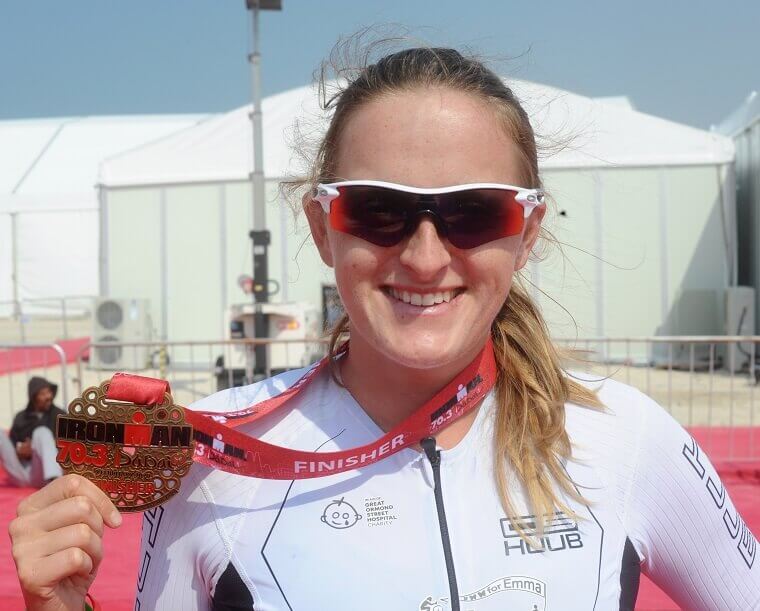
Athletics
How To Cope With Sport Performance Anxiety
Every triathlete, runner or cyclist has mixed feelings about the racing season no matter their experience. Some experience pre-race jitters while others experience far more in the form of sports performance anxiety. In this blog, we take a look at the signs and symptoms of sports performance anxiety and offer advice on how to cope.
4 mins read
Published on
July 14, 2021
Written by
EDGE
Share this article
HOW DOES ANXIETY AFFECT SPORTS PERFORMANCE?
Every athlete experiences ‘butterflies’ pre-competition, but pre-race jitters can become overwhelming and turn into performance anxiety. So, what’s the difference between pre-race jitters and sports performance anxiety? And how can you learn to cope or embrace sports performance anxiety?
PRE-RACE JITTERS
Pre-race jitters or ‘butterflies’ are helpful to your race as it gives you that buzz and excitement you need to get going, you may feel:
-
Excited to start
-
Physically ‘awake’ and alert
-
You can think clearly and are ready to take on the challenge
-
Your heart is beating harder, but it feels natural
-
When the race starts you can relax and ‘go with the flow’
ANXIETY
Whereas anxiety is more a feeling of dread and fear ahead of the race. You don’t feel ready, physically or mentally to take on the challenge and deal with competition stress. This will, in turn, have a negative impact on your performance as you are not mentally strong. In addition, the symptoms that arise as a result of your ‘fight or flight’ response kicking in can also impact your performance, for example, shallow breathing, feeling sick, muscle tension.

WHAT IS SPORT PERFORMANCE ANXIETY?
Sports performance anxiety is an emotional and physical reaction to the stress of competing1.
According to research, some of the causes of anxiety both in training and competition are related to the intensity of the activity performed, the history and level of stressors, the athletes own personality and their ability to cope with stress1.
In addition, there is a correlation between the stressors that cause performance anxiety and sport injury1. In other words, an athlete’s poor response to stress increases their likelihood of injury.
It’s important to recognise the early warning signs of sport performance anxiety and to get the help of a mental health professional to develop coping strategies.
SIGNS AND SYMPTOMS OF SPORTS PERFORMANCE ANXIETY
Signs you may be experiencing anxiety include:
-
Changes in resting heart rate that are not due to a medical condition
-
Changes in muscle tension
-
Mood changes such as irritability, outbursts of anger or easily getting upset
-
Inability to cope with day-to-day situations
-
Feeling tired all the time or even exhausted without any obvious reasons e.g. changes in training load, diet etc.
-
Changes to your sleep pattern, for example, finding it difficult to get to sleep or stay alseep; or sleeping too much
-
Changes to your eating or drinking habits
Other signs that you may be experiencing anxiety ahead of a competition include:
-
Scared before the start of the event rather than excited
-
You feel physically sick or may even have an upset stomach
-
You can’t think clearly or calmly
-
You are irrationally worried about things that might happen during the race
-
Your heart rate increases
-
You breath faster, or with short shallow breaths
-
You may feel dizzy or weak
-
You feel drained before the event even starts
-
You may feel disassociated from those around you
-
You might begin to doubt your overall ability to perform
CAUSES OF SPORTS PERFORMANCE ANXIETY
Common causes of performance anxiety include:
-
Putting too much pressure on yourself to succeed
-
Focusing on results only
-
Fear of failing
-
Poor training leading up to the race – this could be under or over training
-
Lack of rest and adequate nutrition
-
Fear of not performing to expectations
If you feel your pre-race jitters are turning into sport performance anxiety, then you need to learn how to cope with the feelings and channel that energy in a way that works for you rather than against you.
HOW TO OVERCOME SPORTS PERFORMANCE ANXIETY
As with other forms of anxiety, sports performance anxiety can be reduced by various techniques and the support of a trained mental health professional who can help you learn to manage pre-race anxiety.
Learning to understand why you feel anxious, accepting the feelings of anxiety and developing techniques to focus your mind on the positive rather than the negative will help alleviate performance anxiety.
Ways to help overcome performance anxiety include:
-
Setting realistic goals for yourself
-
Relaxation techniques such as breathing and meditation
-
Cognitive Behavioural Therapy to help change negative thinking patterns
-
Learning mindfulness and living in the moment rather than in the past or future
-
Positive visualisation
-
Accepting failures as a natural part of the process
-
Focus on the small wins as well as the big ones!
-
Have a good support network, people you can talk to about your anxiety
It’s also helpful to remind yourself why you do what you do, that’s it’s about enjoying the sport and the buzz you get from competing.
Ensure you are properly prepared ahead of your event can also help lower stress levels and relieve anxiety.
SPORTS PERFORMANCE ANXIETY HAPPENS TO PROS TOO
It’s important to remember that performance anxiety happens across all levels, affecting amateur and professional athletes alike.

Edge Ambassador Sophie Kirk shares her story of pre-race nerves and how she managed to overcome them:
“I was supposed to do Outlaw X in September 2020, but pulled out the week before for several reasons:
-
I couldn’t get my head in the game
The thought of racing filled me with dread. I never sleep before races anyway and with a long summer of no racing I had forgotten all the good parts and could only remember the bad – no sleep, nervousness and stress!
-
I didn’t feel comfortable
to be around so many other people – I had spent the prior few months living in the middle of nowhere. A far cry from life in London during lockdown, avoiding people was normal and the idea of hundreds of athletes coming together for a race just didn’t fill me with glee.
-
I simply wasn’t as fit as I have been
that coupled with the two reasons above really created a serious mental issue for me. I was pretty much crying to anyone who would listen about how stressed I was about the whole thing. Sorry friends!
So, for me, pulling out of the race, and logging out of social media for race weekend was the right thing to do! It also helped when I heard how cold the weather was!
However, I now had a new problem, do I actually want to race anymore – at all? I always thought I was one of those people who dealt with pre-race nerves quite well and that I LOVED racing. But it turns out the thought of being nervous in the day preceding the race was now becoming my biggest roadblock. Why would I want to enter a race knowing I wouldn’t sleep before it? And I’m not as fit as I was so what’s the point anyway?
Entering a 10-mile TT as my next race was a BIG DEAL for me, and a chance to finally put the race demons behind me. It might have only been the local Tuesday night TT, but I was pretty nervous, checking the weather all day.
I needn’t be bothered because we all got soaked during the warmup, but it was still OK and I made it to the start line. Once on the start line something clicked, I forgot all about those pre-race nerves, which had been building for a year, and I was back loving life on the racecourse once more. “
CONCLUSION
Pre-race nerves are a natural part of doing a sport you love at a competitive level, but when those nerves begin to affect your performance and tip over into anxiety you need to seek professional help.
Developing coping strategies will make the build up to race day and the day of competition much easier to deal with. It’s also important to remember why you do what you do, and it’s ok to pull out of a race – as Sophie did – if you are just not feeling your best. But, not to let that hold you back and become a regular excuse as a way of overcoming the anxiety.
Most sports professionals have experienced sport performance anxiety at some point in their career, but you can overcome it and begin to enjoy competing again.
